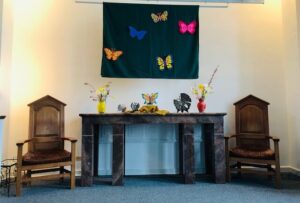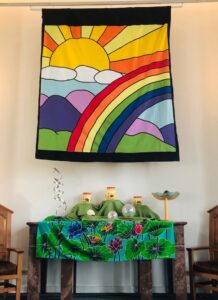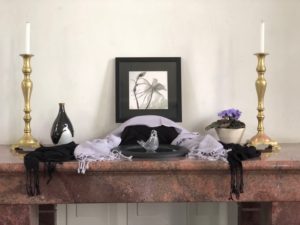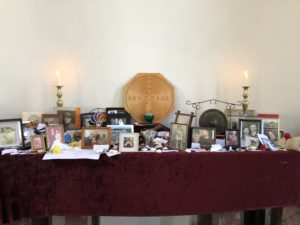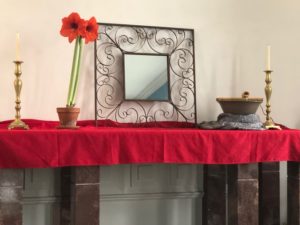That still, small voice inside of us is like a beam of light, evaporating the chaos of a turbulent world. The way toward our still, small voice is listening to what is inside us with discernment and compassion and believing it.
When empowering beliefs seem so quiet and hard to hear but angry, uncompassionate voices seem loud and clear, what is it that grounds us, that makes us feel secure and confident, that makes us feel worthy, that we belong and that we are in fact entitled to our lives, not as a support to some cause or group or person outside of ourselves, but entitled to our own breathing, human body and the life we are living on this earth while we still have life to live?
Religions and thinkers the world over try to provide us with metaphors and imagery to tap into our inner voice. The phrase “that still, small voice” is from the story of Elijah at a moment of crisis when he needed a big sign from God like thunder or fire, but that instead came to him in a whisper.
There are other words to describe it like intuition, the spirit that guides us, voice of God, our inner voice, instinct. But no matter how it is named it is listening to our inner voice that can guide us through uncertain times.
So how do we discern that still small voice from all the rest? There are all kinds of parts of us, each with something to say: thoughts, feelings, opinions, memories of previous experiences, things we learned growing up, things we learned from the people around us, reactions, logical thought, ideas, creative thoughts, imaginations. And that’s just what’s going on on the inside. On the outside, we may be in situations that are stressful or toxic, we may be getting or lacking information.
Peter Senge – systems scientist at MIT School of Management calls listening “the art of developing deeper silences in yourself, so you can slow our mind’s hearing to your ears’ natural speed, and hear beneath the words to their meaning.”
With all of those voices trying to be heard, we can listen, taking in information and decipher between the things we need and the things we want.
I may want things to go back to the way they were, but I just need to be in a reasonably safe place. I want to keep the people in my life that I have today but what I really need is for them to know how much I love them no matter what happens.
Is instinct our still, small voice? One of the first guidelines in de-escalation and crisis prevention training courses is how to know when you are being verbally or emotionally harmed. And the guidance that’s given is: You know it when it happens to you. Because you can feel it. Trust your instincts.
It is your body’s natural way of quickly getting you important information, when the hairs on the back of your neck stick up or you experience an uneasy feeling. Our job is to recognize those feelings and to believe it. Humans have so much capacity to take in information and process it subconsciously, we only have words like “instinct” or “intuition” to describe it. But we have amazing capabilities even if it doesn’t seem logical and even if we can’t specifically verbalize how we know it.
A gentleman once asked me: Wasn’t George W. Bush listening to his gut instinct when he started the wars in Afghanistan and Iraq? Probably. Making good decisions, however, is a skill that needs to be practiced. Decision-making can be informed by a myriad of sources of which our feelings and instincts are a part. If we gather only some information and ignore others, we may not have enough to act on.
Noted researcher Brene Brown describes “Intuition is not a single way of knowing—it’s our ability to hold space for uncertainty and our willingness to trust the many ways we’ve developed knowledge and insight, including instinct, experience, faith, and reason.”
The compassionate way to listen is to hear each voice and discern while not being taken over by it. Listen compassionately without judging.
When we think of compassion, there are parts of our culture that treat it like a “nice to have”. Feminine, soft – compassion is, as the Christian scripture from Mark says: “love your neighbor as you love yourself” …. Well, until the rubber meets the road or the heat gets turned up and then it’s time to drop all those frivolous things and get down to business. Get things done. I wouldn’t usually want to quote Wikipedia, but I thought the phrasing was telling as it describes compassion as motivation for someone to go out of their way to help another. It’s above and beyond, like icing on the cake. Non-essential. Perhaps compassion can seem like an obligation and it can be a relief to not be driven by it.
But this attitude toward compassion is pervasive in our society. A young woman had a job once at an apartment complex where new management said that tenants may question what we do but we don’t have to listen and eventually they will leave. She had an uneasy feeling at the time but also liked hearing that they were going to move ahead despite any criticism. It made her feel impenetrable, free to do what they wanted, but another part of her felt uncomfortable at the idea of not listening. Later on, tenants complained that supers wouldn’t fix things or that large sections of the building were under renovation for much of the year. Eventually, she saw that management’s attitude caused good, long-time tenants to leave their friends and neighbors, tearing apart what had once been a profitable housing unit. What she realised was in fact the absence of compassion was not “no harm, no foul” but the absence of compassion actually caused harm.
We see the results of the absence of compassion in the news. ProPublica published audio this week of “children separated from their parents… [who] can be heard sobbing and wailing, and calling for their mother or father.” And over those voices came an adult voice mocking them.
Colleen Kraft, president of the American Academy of Pediatrics said, “By separating parents and children, we are doing irreparable harm to these children. The long-term concern of what we call toxic stress is that brains are not developed efficiently or effectively”
The absence of compassion is not “no harm”. The absence of compassion is a form of violence.
In some ways, this represents how we treat different parts of ourselves. Do we ignore our own sadness and grief and instead embrace anger? Do we ignore doubt and uncertainty and instead embrace the strong and clear? What parts of ourselves have we shut down and put to the side because we deem it “not as important”. We say: Yes, I feel uncertainty, but it is not as important as giving a good face because others are depending on me. Yes, I feel deep sadness but it is not as important as making sure others think that I am OK and not a mess. Yes, I feel frustration but it is not as important as keeping the peace.
What if we shared that deep uncertainty with each other? What if we found out that yes, our neighbor feels it too? That in fact we share a feeling of uncertainty? Would we discover our true bonds with each other? Our common humanity?
Now you may say, those guards and policy makers, they are not us, we are not them. However, us versus them is the beginning of the absence of compassion.
Perhaps the remedy is compassion or as Dr. Paul Gilbert, a British clinical psychologist describes it: “compassion is an antidote to cruelty”
When your inner voice is speaking, you feel a sense of clarity, eureka, relief, an undeniable knowing, no sinking feeling that something is wrong, the body relaxes.
According to author Shakti Gawain: “Every time you don’t follow your inner guidance, you feel a loss of energy, loss of power, a sense of spiritual deadness.”
We can create a compassionate space within to calm the mind so we can listen to our still, small voice.
The image of the mother and child in your order of service is by Mary Cassatt. I chose this piece because of the look on the child’s face. Gazing into her mother’s eyes. The mother’s hand gently laid on her daughter’s cheek. It’s such a loving, tender moment.
It is an image that can create a compassionate, calming space inside to hear that still, small voice.
A friend who works with trauma survivors using eco-therapy said “…to access that still small voice, we have to realize that it can easily be covered up by all of the stress and chaos of our lives, which is why intentional contemplative practices or time in calming settings (nature for example) is so important, because it helps our nervous systems calm”
The inner voice can take different forms. Oprah expressed “It’s not as though I hear a voice. It’s more like a little kid tapping me on the shoulder. It’s something I feel.”
A young man who had had a close relationship with his grandfather found that his grandfather’s voice had become his own inner voice. Even when he was partying too hard and doing drugs, he would hear his grandfather’s voice saying that it was time to stop and go home. Eventually, that voice saved his life when despite the advice of doctors, he insisted they keep trying to diagnose his mysterious illness. It was his grandfather’s voice that guided him to accurate and good outcomes and provided wisdom.
One of the journalists who broke the Harvey Weinstein story, Ronan Farrow spoke recently about “personal, professional and legal risks so significant, they culminated in an emotional breakdown in the backseat of a cab….” He says “you will face a moment where it will be totally unclear to you what the right thing is for you, for your family, for your community. And I hope that in that moment you’ll be generous with yourself, but trust that inner voice.”
I’ve noticed many unusual storms of late. Just this week, I saw rain clouds in a shape I’ve never seen. It looked like an upside-down tidal wave of grey clouds. I looked at it in wonder and distress and thought to myself that even the storms look different these days – bigger, strange, unfamiliar. At that moment, it began to pour.
I don’t know what the storms of our future will look like. But I do know that each of us has an inner voice. A voice that can cut through the clouds like a beam of sunlight.
For a moment this week, I had a vision of a break in the clouds after a storm. Maybe even standing amongst what had been there before. A couple of planks of wood on the ground. Torn pieces of paper. A photograph. The sun coming through a spot in the clouds – the storm was over and we could rebuild again.
For a moment I felt I had glimpsed a possibility that even with the storm’s destruction it was possible to come back together to rebuild something we all could agree on and live with. One that had compassion at its heart.
Listen to your inner voice with discernment and compassion and believe it.
The break in the storm, that beam of light is the clarity of your inner voice, cutting through the storm of uncertainty with confidence and resilience.
Because my inner voice is telling me that it is going to be OK. I might not know what the future will look like, but I do know that whatever that future brings, we can get through it. Because no matter what you are worthy and you belong.
-Wendy Repass



